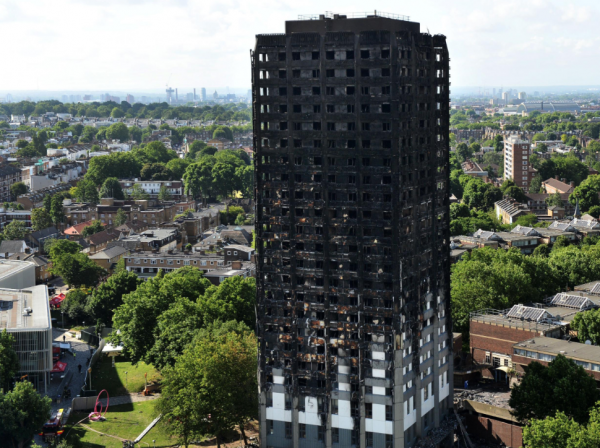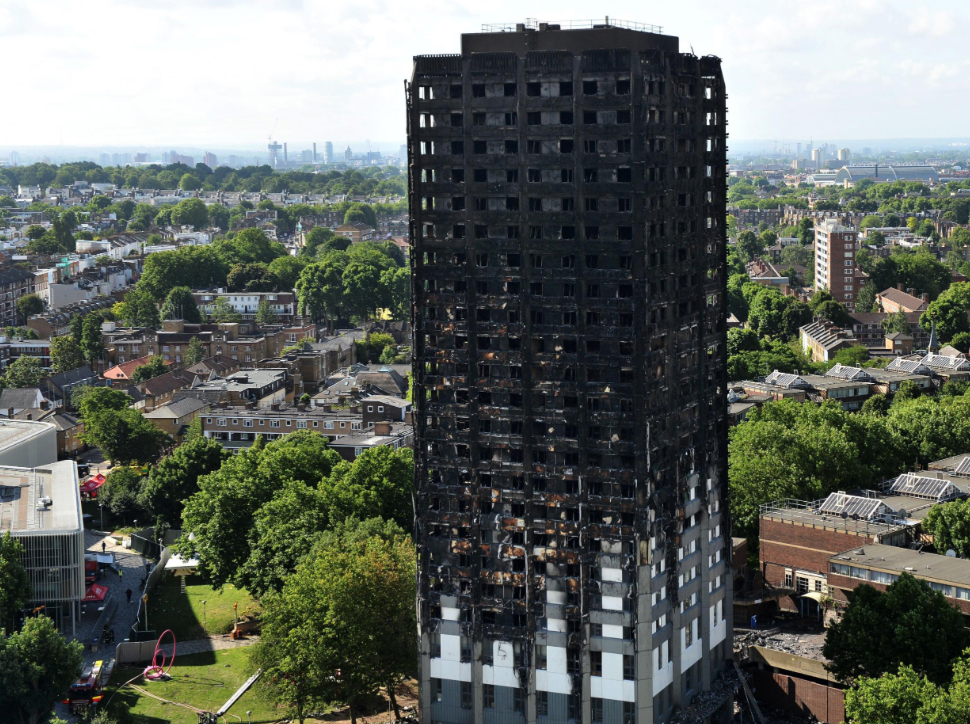
As you drive in from Heathrow Airport to London, it is not long until you see, not far away, a tall, dark building. As you come nearer, you see it is the burned-out husk of a multi-storey tower block – Grenfell Tower, which burned almost exactly one year ago, causing the deaths of 72 people.
The inquiry into Grenfell starts this week. It will go on for several months. It will find that the owner of the property devolved all responsibility to a Tenancy Management Organisation (TMO) which maximised profits by ignoring any and all complaints from tenants while ruthlessly pursing unpaid rents.
There was a particular meeting that took place behind closed doors one fateful day, that made a decision to cut costs on the recladding of the building and cover it in a good-looking but highly flammable material, instead of the fire-retarding alternative. Ex-residents of Grenfell have fought to get the minutes of this meeting under the official disclosure act, but of course the TMO is a private operation not subject to disclosure rules.
This couldn’t happen here, of course, as we don’t have high-rise ghettos, do we? Well perhaps we do in Auckland, especially those large buildings erected on the waterfront some 20 years ago, which are comprised of chicken-coop sized flats to accommodate foreign students. As a Christchurch person, I never understood why these enormous blocks were allowed to be built, almost deliberately designed to block out any view of the harbour. Would a fire in one of those buildings, which were erected during the ‘wild west’ period of the free market on building codes, reveal similar problems to Grenfell? Let’s hope we never have to find out.
While we don’t have much of the high-rise ghetto model that has blighted parts of the UK, we do have major problems with our housing infrastructure. Even putting aside the Christchurch earthquake issues (which continue), the leaky building scandal (ditto) and the mass shedding of Council and State housing in the neo-liberal era, we have significant housing problems here.
The first problem is that houses are not well-insulated against the cold winters caused by our oceanic climate. While newer houses are well-insulated, and there has been quite a lot of retro-fitting, keeping our properties warm in winter is a struggle for many.
Second, there is no mass, cheap systems of central heating such as are common in the USA and UK. Heat pumps are increasingly offering effective heating systems but, while cheaper than radiant heating, they are still expensive in homes that are not well-insulated, and especially in Christchurch where nights are so cold.
Apart from heating issues, which were often placed beside child health, participants in my large research study into grandparents raising grandchildren had other concerns about housing. Actually, more than half of them had significant problems with housing. They should be listened to.
Three issues played out in relation to each other. They were cost (affordability), appropriateness of housing (condition, location etc) and size. We were told some heart-breaking stories of great-grandparents forced to sleep on the couch while the grandchild was given the only bedroom in the property.
Several grandparents noted that they could not afford to rent or purchase a property of the size needed to house the young people who had come to live with them. Many of the grandparents had three generations, and in some cases four, living with them. For many of them, there were no effective answers that allowed housing to be affordable, adequately sized and appropriate. The same problems play out the whole time throughout the country, especially in the cities.
The lesson of the past thirty years is that housing cannot be left to the private sector and to the free market. Good housing promotes longevity, good health, family stability, child education and safety. The problems we have here of housing poverty, including homelessness, poor quality housing and unaffordable accommodation should never have occurred, but are as bad in their own way as the Grenfell disaster in the UK, if on a more dispersed scale.
I live in an ex-state house, built 78 years ago almost entirely of Rimu felled from the great South Island forests. It survived thousands of earthquakes with just a few cracks. While it now has a modern kitchen and bathroom, a mighty heat pump that operates most of winter and mains-pressure hot water heated by gas, it is still the same large four-bedroom house on a big section built by the state (during a world war) in a strong belief that people living here should have the benefits of good housing. A fabulous heritage, that seems almost unreachable now for many.
Dr Liz Gordon began her working life as a university lecturer at Massey and the Canterbury universities. She spent six years as an Alliance MP, before starting her own research company, Pukeko Research. Her work is in the fields of justice, law, education and sociology (poverty and inequality). She is the president of Pillars, a charity that works for the children of prisoners, a prison volunteer, and is on the board of several other organisations. Her mission is to see New Zealand freed from the shackles of neo-liberalism before she dies (hopefully well before!).





